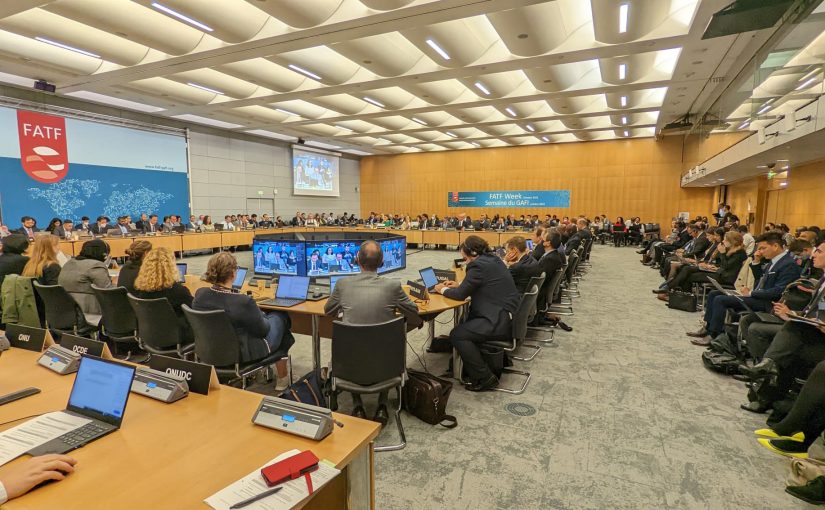Mozambique: Parliament approves plan and budget
DRC, Mozambique and Tanzania placed under increased monitoring by FATF

Jurisdictions under increased monitoring are actively working with the FATF to address strategic deficiencies in their regimes to counter money laundering, terrorist financing, and proliferation financing, FATF says. Albania, Barbados, Burkina Faso, Cambodia, Cayman Islands, Democratic Republic of the Congo. Gibraltar. Haiti, Jamaica, Jordan, Mali, Morocco, Mozambique, Panama, Philippines, Senegal, South Sudan, Syria, Tanzania, Turkey, Uganda, United Arab Emirates and Yemen are currently on the list. [ Photo: Twitter / (@FATFNews]
Following review, the Financial Activities Task Force (FATF) announced ton Saturday (October 21 2022) at the end of their latest plenary in Paris the placement of Democratic Republic of the Congo, Mozambique, and Tanzania on the list of jurisdictions under increased monitoring, popularly referred to as the “grey list”.
The FATF plenary has concluded. Delegates of governments from around the world discussed a range of money laundering and terrorist financing issues. See the outcomes of the plenary here ➡️ https://t.co/egdelCctUJ #FollowTheMoney pic.twitter.com/J0GPvwfbum
— FATF (@FATFNews) October 21, 2022
When the FATF places a jurisdiction under increased monitoring, it means the country has committed to resolve swiftly the identified strategic deficiencies within agreed timeframes and is subject to increased monitoring.
Assessments take place 3 times a year and in order to have these decisions reversed, the three countries will have to prove through material evidence that all recommendations made by FATF has been comply and that the country no longer have the deficiencies identified by the Task Force. Reversing the decision (and being removed from the list) is achieved once the country complete a specific action list and depends largely on the complexity and depth of the deficiencies. There is no specific timeframe to comply with the action list, however, it is very possible to reverse the decision in a relatively short time. Mauritius is a good example, having been removed in less than two years on the grey list.
The DR Congo, Mozambique and Tanzania have entered the FATF’s Jurisdictions under Increased Monitoring list, often referred to as the ‘grey list’, following the conclusion of the FATF Plenary. See the full update here➡️https://t.co/OvPfPyx63I #FollowTheMoney pic.twitter.com/otFztHyUWV
— FATF (@FATFNews) October 21, 2022
In terms of actual consequences, although DRC, Mozambique and Tanzania will be the subject of higher compliance scrutiny by banks on most financial transaction involving an international operation, such as a wire transfer, market observers noted that there were no determinations pointing to the termination of correspondent banking and other financial relationships none of the 3 countries, rather a risk-based approach will be taken by international operators. It is important to note however, that the countries will be under constant monitoring and a lack of progress on the implementation of the recommended action plan could create more serious consequences.
Although perhaps unrelated, the inclusion of the DRC, Mozambique and Tanzania under the increased monitoring list, comes at a time when these economies are showing strong signs of recovery with positive growth prospects largely based on energy and mineral resources – the very commodities in high demand by developed countries given the Ukraine conflict, incidentally the same group making most of the assessments and decisions at FATF.
It’s the final day of the FATF plenary in Paris. Government delegates and partner organisations, including the @UN, @IMFNews & @WorldBank, have been discussing money laundering and terrorist financing issues. News conference expected at 1700 Paris time ➡️ https://t.co/GcbyUOujhZ pic.twitter.com/oEP31XuNel
— FATF (@FATFNews) October 21, 2022
The Democratic Republic of the Congo
As per the FATF report, the DRC made a high-level political commitment to work with the FATF and GABAC to strengthen the effectiveness of its AML/CFT regime. Since the adoption of its MER in October 2020, the DRC has made progress on some of the MER’s recommended actions including making confiscation of proceeds of crime a policy priority. The DRC will work to implement its FATF action plan by: (1) finalising the NRA on ML and TF and adopting an AML/CFT national strategy; (2) designating supervisory authorities for all DNFBP sectors, and developing and implementing a risk-based supervision plan; (3) adequately resourcing the FIU, and build its capacity to conduct operational and strategic analysis; (4) strengthening the capabilities of authorities involved in the investigation and prosecution of ML and TF; and (5) demonstrating effective implementation of TF and PF-related TFS.
Mozambique
As per the FATF report, Mozambique made a high-level political commitment to work with the FATF and ESAAMLG to strengthen the effectiveness of its AML/CFT regime. Since the adoption of its MER in April 2021, Mozambique has made progress on some of the MER’s recommended actions to improve its system including by finalising its NRA and strengthening its asset confiscation efforts. Mozambique will work to implement its FATF action plan by: (1) ensuring cooperation and coordination amongst relevant authorities to implement risk-based AML/CFT strategies and policies; (2) conducting training for all LEAs on mutual legal assistance to enhance the gathering of evidence or seizure/confiscation of proceeds of crime; (3) providing adequate financial and human resources to supervisors, developing and implementing a risk-based supervision plan; (4) providing adequate resources to the authorities to commence the collection of adequate, accurate and up-to-date beneficial ownership information of legal persons; (5) increasing the human resources of the FIU as well as increasing financial intelligence sent to authorities; (6) demonstrating LEAs capability to effectively investigate ML/TF cases using financial intelligence; (7) conducting a comprehensive TF Risk Assessment and begin implementing a comprehensive national CFT strategy; (8) increasing awareness on TF and PF-related TFS; and (9) carrying out the TF risk assessment for NPOs in line with the FATF Standards and using it as a basis to develop an outreach plan.
READ: Mozambique: Prime Minister downplays threats of credit cards suspension
Tanzania
As per the FATF report, Tanzania made a high-level political commitment to work with the FATF and ESAAMLG to strengthen the effectiveness of its AML/CFT regime. Since the adoption of its MER in April 2021, Tanzania has made progress on some of the MER’s recommended actions to improve its system including by developing legal framework for TF and TFS and disseminating FIU strategic analysis. Tanzania will work to implement its FATF action plan by: (1) improving risk-based supervision of FIs and DNFBPs, including by conducting inspections on a risk-sensitive basis and applying effective, proportionate, and dissuasive sanctions for non-compliance; (2) demonstrating authorities’ capability to effectively conduct a range of investigations and prosecutions of ML in line with the country’s risk profile; (3) demonstrating that LEAs are taking measures to identify, trace, seize, and confiscate proceeds and instrumentalities of crime; (4) conducting a comprehensive TF Risk Assessment and begin implementing a comprehensive national CFT strategy as well as demonstrating capability to conduct TF investigations and pursue prosecutions in line with the country’s risk profile; (5) increasing awareness of the private sector and competent authorities on TF and PF-related TFS; and (6) carrying out the TF risk assessment for NPOs in line with the FATF Standards and using it as a basis to develop an outreach plan.
The case for South Africa
The review period for South Africa ends this October, and the FATF expects a concrete plan to address the 20 areas in which SA was judged to be lacking. Currently, this seems unlikely to materialise, as the process would require legislation to be passed through parliament. On a positive note, the country has already recently announced that it approved the submission of new amendment bills for anti-money laundering and combatting terrorism financing. Furthermore, the FATF plenary only convenes in February 2023 for the final decision, providing some hope that the technical compliance aspect of the recommendations could be satisfied in time.
READ: Global watchdog’s gray listing threat hangs over Mozambique – Bloomberg
The challenge will likely be the effectiveness measures aspect of the recommendations. Satisfying this is dependent on SA’s prosecutorial capacity, meaning SA will have to drastically step-up policing, prosecuting and asset forfeiture. It seems unlikely that SA will timely satisfy the FATF. A middle-road outcome could also include SA being placed on enhanced follow-up – both Treasury and the SARB have expressed their doubts. With this said, the crucial consideration becomes the impact on capital markets.
By Elizabeth Khumalo
Pakistan and Nicaragua have been removed from the FATF’s Jurisdictions under Increased Monitoring list, often referred to as the ‘grey list’. See the full update on the list here➡️ https://t.co/OvPfPyeWPA #FollowTheMoney pic.twitter.com/7p7j9lzrIC
— FATF (@FATFNews) October 21, 2022













Leave a Reply
Be the First to Comment!
You must be logged in to post a comment.
You must be logged in to post a comment.